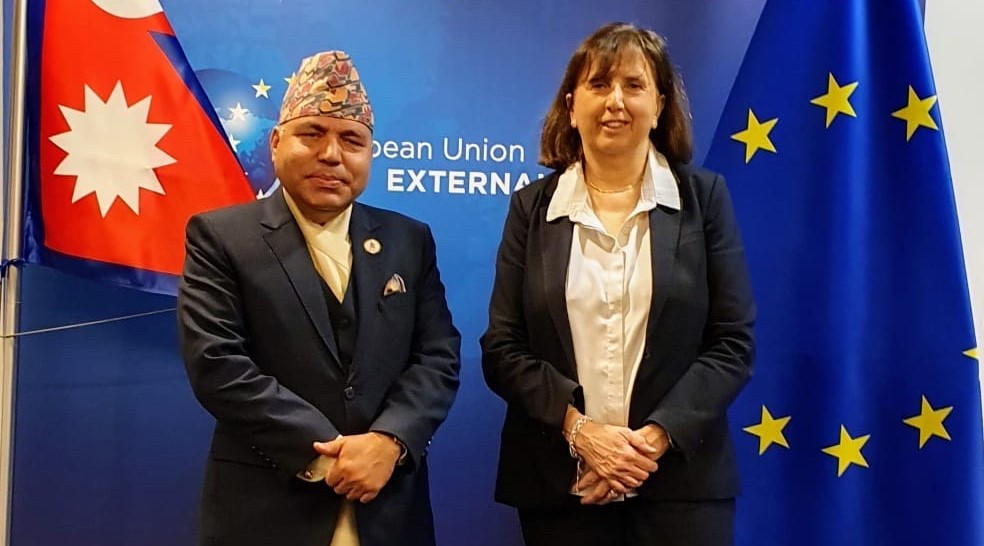KATHMANDU: The European Union (EU) has offered close cooperation during the transition period following Nepal’s graduation from the category of a Least Developed Country (LDC) to a middle-income country.
The EU pledged its support to help Nepal graduate from the LDC smoothly during the 14th Joint Commission (JC) meeting of Nepal and the EU held in Brussels on Wednesday.
The EU and Nepal discussed bilateral trade relations in light of Nepal’s future graduation from LDC status in 2026. Nepal has expressed its desire to diversify its exports to the EU, make full use of the benefits offered by the “Everything But Arms” trading regime, while preparing to apply for the EU Generalised Scheme of Preferences Plus (GSP+) arrangement.
“The EU offered close cooperation during the transition period following Nepal’s graduation from Least Developed Country status, and asked Nepal to share its graduation strategy, also stressing the importance of an open and competitive business environment,” said a joint statement issued after the JC meeting.
The meeting was co-chaired by Deputy Managing Director for Asia and the Pacific of the European External Affairs Service Paola Pampaloni and Foreign Secretary Bharat Raj Paudyal. The working lunch on foreign policy was co-chaired on the EU side by Enrique Mora, Deputy Secretary General/Political Director of the European External Action Service.
The two sides exchanged views on a range of issues, a sign of deepening ties and expanding the EU-Nepal agenda during the meeting. “The EU and Nepal reiterated their support for a rules-based international order with the UN at its core, as well as their commitment to safeguard the principles of the UN Charter,” said the statement.
In the first JC meeting under the new leadership in Nepal, following the federal and provincial elections on 20 November 2022, both partners expressed determination to continue working on strengthening bilateral ties further. They also underlined the importance of further strengthening the representation of women and disadvantaged groups. The EU welcomed Nepal’s commitment, as expressed in the Government’s Policy Priorities and Minimum Programme of January 9, 2023, to prioritize the tabling in the Parliament of those key draft pieces of legislation that would promote further the implementation of the Constitution and the completion of the remaining tasks of the peace process, namely transitional justice. The two sides also discussed the need to continue the efforts of controlling corruption and promote good governance.
Human rights, in particular the situation of women, children and disadvantaged communities, were discussed at the meeting. The EU and Nepal confirmed their intention to constructively engage in the Human Rights Council on the matters of common interest, and the EU invited Nepal to give positive consideration to the pending requests for visits of UN Special Rapporteurs, according to the joint statement.
The EU and Nepal also highlighted strong investment potential, notably in the area of renewable energies. The EU encouraged Nepal to take advantage of investment opportunities, including from the European Investment Bank and other European financial institutions, which can be supported by guarantees and grants through the new European Fund for Sustainable Development Plus (EFSD+). Such investments are expected to support shared priority objectives in areas such as green and sustainable economic development and poverty reduction.
“The EU and Nepal reaffirmed that air safety was among the key priority areas of their bilateral relations. They both agreed that the EU on-site assessment planned for mid-February would be postponed to a later date, to allow the Civil Aviation Authority of Nepal (CAAN) to deal with the aftermath of the recent airline crash,” added the statement.
Among other things, the EU and Nepal discussed regional processes and existing platforms to foster economic integration. The EU highlighted the Global Gateway as an instrument to strengthen regional inter-connectedness, notably in energy and digital areas. The next Joint Commission meeting will take place in Kathmandu in 2024.
Nepal-Belgium Bilateral Consultation Mechanism held in Brussels
The second meeting of the Nepal-Belgium Bilateral Consultation Mechanism was held at the Federal Public Service, Foreign Affairs, Foreign Trade and Development Cooperation of the Kingdom of Belgium on Thursday.
Joint Secretary at the Ministry of Foreign Affairs Sewa Lamsal and Ambassador Cornet d’Elzius, Director of the Asia-Oceania Department jointly led the proceeding.
During the meeting, the two sides took stock of all aspects of bilateral relations and exchanged views on further promoting cooperation between the two countries. Views were also exchanged on engaging in global issues such as climate change and Sustainable Development Goals, according to a press statement issued by the Ministry of Foreign Affairs (MoFA).
The Nepali side shared about the country’s graduation from the LDC status in 2026 and the preparation of transition strategy and requested for the continuation of support measures provided by Belgium as well as the EU in terms of market access and development cooperation.
The two sides discussed the various ways of enhancing cooperation in the areas of trade, tourism and investment and promoting people-to-people contacts. The regional and international issues of mutual interests were also discussed during the meeting, the MoFA said.

